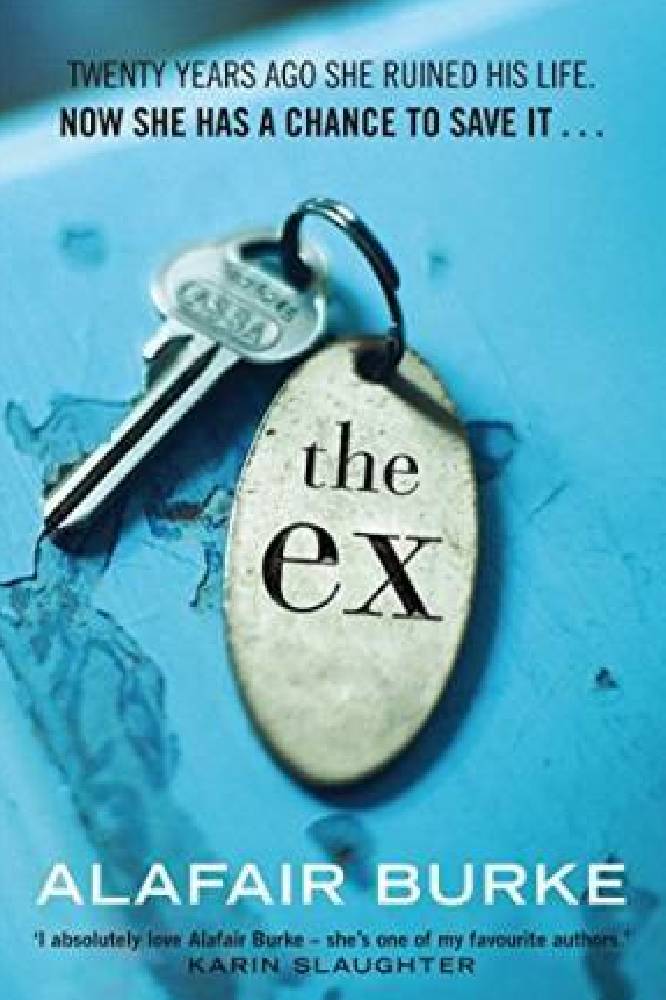I don't believe in destiny, but I also can't deny that every good thing in my life seems to have started with something that could have gone terribly wrong. My ridiculously happy marriage of ten years? Wouldn't have happened if I hadn't screwed up big time in a relationship that managed to bring me to New York City. My job as a tenured law professor? Ditto. And the fact that my eleventh novel, THE EX, is being published? Yes, I've got a story for that one, too.

The Ex
In March of 1995, I was a twenty-six-year-old Deputy District Attorney. Fresh out of a plumb clerkship with a federal appellate court judge, I had turned down high-paying, prestigious law firm offers because I wanted to be a prosecutor. No, scratch that. I just knew I had to be a prosecutor. I had shown up to my first day of work wearing an ivory silk blouse, double-breasted navy suit, and practical round-toed pumps. A string of pearls completed my uniform. Super-serious trial lawyer, reporting for duty.
I was handed three misdemeanor case files, all scheduled for trial that day. Odds were, one would no-show, one would plead guilty, and one would go to trial. I was going to have a trial!
But I didn't get a trial that day, or the day after, or even once by the time March 1995 came around, seven months later. A few minutes after my earnest hands grabbed those case files, the supervisor of the misdemeanor unit showed up in a panic. CSU needed another lawyer and, well, oops, he forgot. He looked quickly at the two new attorneys starting that day: me and a guy I'll call Jason, both of us strangers to him. "Send her to CSU," he decided.
CSU? Crime Scene Unit? Cool stuff unit? Crazy shit unit? Sounded like it might be awesome. It wasn't. It was the child support unit, and it wasn't even in the courthouse. "Three months," I was told. "Six max." I couldn't help but notice that the entire unit was staffed by women, and the vast majority of the "work" involved rubber stamping documents (literally, I had a stamp with my signature on it).
Then as my seventh month of service was ending and I was preparing to mail out resumes, the First Assistant (next in charge after the District Attorney himself) called me into his office on a Friday afternoon. To say he had a reputation as a womanizer is an understatement. Great, I thought. I'm about to get sexually harassed on top of everything else.
But that's not what happened. He had a special project for me. Police had just arrested a man for killing his girlfriend. In the course of confessing to the crime, the man also confessed to several other murders, including the strangling death of a woman named Taunja Bennett, five years earlier. The problem was, two other people had already been convicted of that crime.
Naturally, police were skeptical. But then the man led detectives out to the Columbia Gorge, pointed to five years' growth of blackberry bushes, and said, "I threw her purse over there." Sure enough, beneath the dense tangles of knotted vines, police found a weathered and battered purse. The victim's identification was still inside.
The man's self-incrimination didn't stop there. He also claimed to be the author of a series of confessional letters that had been mailed to and published by a local investigative reporter, all signed with a Happy Face. And now, while Jason was still trying shoplifting and DUI cases, I was working on the Happy Face Killer investigation. My job was to draft the documents that would explain to a judge why we needed to release the two defendants who'd already served five years in prison for a crime they didn't commit.
How'd the First Assistant know to ask me? My supervisor in the child support unit had reminded him that he had a young lawyer across the street with federal clerkship experience, meaning I could write a lot, and quickly.
Halfway into a long weekend of work, I found my imagination wandering. How do we know, I asked, that the Happy Face Killer doesn't know the two original defendants? Couldn't the three of them have acted in concert? We eventually discarded the theory, but the idea stuck with me: What if?
As four more years in the office passed, I continued to ask, "What if?" By the time I left the District Attorney's Office (to follow a boy to New York, see above), I had fictionalized that case in so many ways that I had the plot for what eventually became my first novel.
Working on the Happy Face Killer case and a book plot weren't the only good things to come out of that weekend. The First Assistant with the bad reputation became my close friend, mentor, and loyal champion within the office, proving that you can never judge a book by its cover.
Since then, I have continued to re-imagine actual cases by asking myself, But what if this, and what if that? In my new novel, THE EX, I imagine an all too imaginable mass shooting in New York City, with surprising causes and consequences. And I continue to draw everyday on my experience at the District Attorney's Office. The people. The culture of the courthouse. The dialogue and the voices. The unexpected allies for a woman working in a man's world. The way that one odd decision- send her to CSU-can be life changing.
The Ex by Alafair Burke is published in February by Faber & Faber (£12.99)

